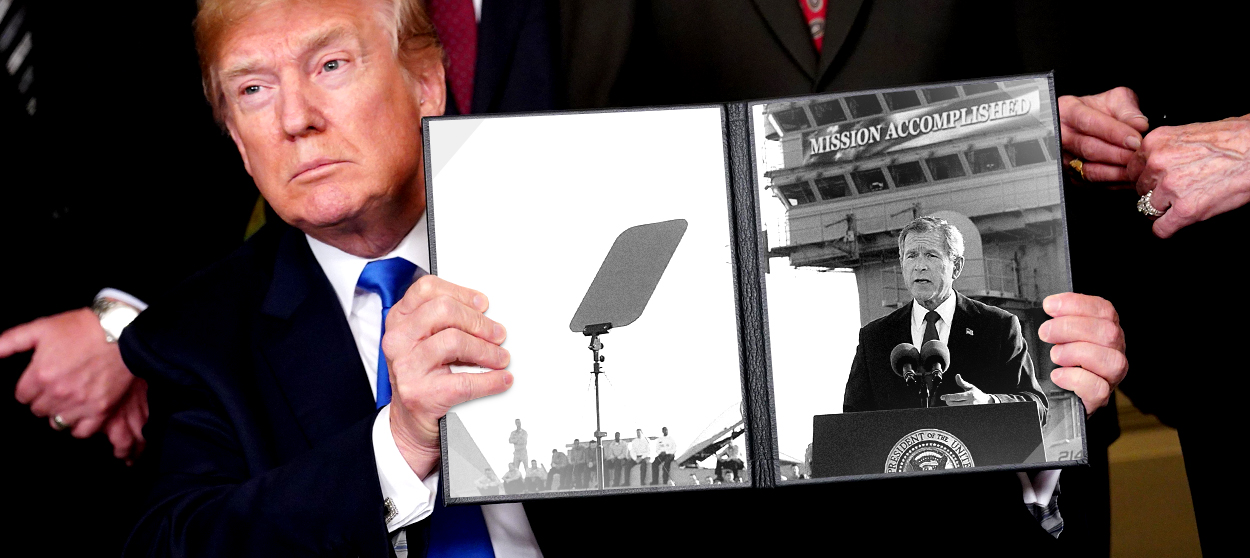Why Trump's trade war is becoming eerily similar to Bush's Iraq War
Unnecessary war of choice? Check. Overpromised success? Check. Trying to escalate your way out of a quagmire? Check.


A free daily email with the biggest news stories of the day – and the best features from TheWeek.com
You are now subscribed
Your newsletter sign-up was successful
It turns out that Donald Trump is a lot more like George W. Bush than we realized.
Trump rose to the presidency, in part, by differentiating himself from Bush. He even told audiences that he opposed the 2003 invasion of Iraq in real time. That was a lie, but it let Trump present himself to the electorate as a different kind of Republican, one less likely to send American troops abroad in search of monsters to destroy.
So far, Trump has proven more inclined to nuke a hurricane than to drop bombs on Iran. But a closer look at his recent presidency suggests he shares some strategic similarities with his much-maligned predecessor: The trajectory of Trump's trade war with China is starting to look a lot like the Bush's arc of failure in Iraq.
The Week
Escape your echo chamber. Get the facts behind the news, plus analysis from multiple perspectives.

Sign up for The Week's Free Newsletters
From our morning news briefing to a weekly Good News Newsletter, get the best of The Week delivered directly to your inbox.
From our morning news briefing to a weekly Good News Newsletter, get the best of The Week delivered directly to your inbox.
Consider these similarities:
They both launched unnecessary wars of choice. Bush came to office in 2001 with influential Republicans calling for a rematch of his father's 1992 war with Saddam Hussein's Iraq. The 9/11 attacks on America had nothing to do with the Iraqis, but Bush administration officials used the attacks — along with faulty intelligence suggesting Hussein was building weapons of mass destruction — as a pretext to invade.
Similarly, Trump arrived in the White House itching for a confrontation with China, determined to reduce the U.S. trade deficit with that country. Bush at least had the nominal support of Congress when he invaded Iraq; Trump launched his trade war entirely on his own in June 2018 by imposing $34 billion worth of taxes on Chinese goods.
They both overpromised success. "Now, I think things have gotten so bad inside Iraq, from the standpoint of the Iraqi people, my belief is we will, in fact, be greeted as liberators," Dick Cheney, Bush's vice president, said in early 2003.
A free daily email with the biggest news stories of the day – and the best features from TheWeek.com
"When a country (USA) is losing many billions of dollars on trade with virtually every country it does business with, trade wars are good, and easy to win," Trump tweeted in March 2018.
Both tried to escalate their way out of an apparent quagmire. After a war-weary electorate dismissed Republicans from power in Congress in November 2006, Bush did the opposite of what was expected and ordered "the surge" of additional troops to Iraq. Today, some Republicans say that act helped the U.S. avoid defeat in the war; in truth, as the rise of ISIS eventually made clear, it simply helped buy a little time in the face of a disaster that still haunts Iraqis today.
Similarly, despite ample evidence that China won't yield to his demands — including billions of dollars spent compensating American farmers for lost trade — Trump has continued to raise tariffs, with only occasional, quickly reversed signs he is willing to back down.
All of which raises again the question posed at the outset of the Iraq War by a famous general: "Tell me how this ends?" In both cases, there is no clear or satisfying answer apparent.
There are other similarities between the wars launched by Bush and Trump — Sen. Lindsey Graham (R-S.C.) backed both men the whole way, while House Speaker Nancy Pelosi ultimately proved unwilling or unable to do much to intervene — but the parallels are limited: Bush's shooting war left thousands of people on both sides dead. Trump's trade war is costly, but obviously not as bloody. Still, both kinds of wars are launched by elites who are insulated from their effects, while regular people bear the real costs of governmental action. Trump can keep the trade war going because it's not his farm that will go bankrupt as a result; Graham can talk blithely about Americans accepting the "pain" of the trade war because he doesn't have to worry about what rising prices at Walmart might mean for his ability to feed his family.
It also seems likely that Trump's trade war will produce at least one more similarity to the failure in Iraq. Bush left office with U.S. prestige in tatters, criticized for his administration's tendency to act unilaterally instead of in concert with allies. Trump's "America first" streak seems to be producing the same results.
America's 21st century Republican presidents keep acting alone, overreaching, and disregarding our friends who want us to do better. At what point does the United States simply run out of credibility as a result?
Joel Mathis is a writer with 30 years of newspaper and online journalism experience. His work also regularly appears in National Geographic and The Kansas City Star. His awards include best online commentary at the Online News Association and (twice) at the City and Regional Magazine Association.
